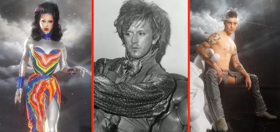
Ricky Martin just experienced what might be the biggest backlash of his career, and it had nothing to do with his sexual orientation. In fact, it far exceeds any fallout that rained down on him when he came out in 2010.
What did Martin do to upset the peanut gallery? He didn’t sexually harass anyone, use a racial slur, lip sync “Livin’ la Vida Loca” on a Macy’s Thanksgiving Day Parade float, or get caught wearing fur. His high crime: posting a photo of himself wearing a Native American headdress on Instagram.
Oh, the horror.
The social-media watchdogs went barking mad, charging him with cultural appropriation. In true scolded-celebrity fashion, Martin deleted the photo.
How about we take this to the next level?
Our newsletter is like a refreshing cocktail (or mocktail) of LGBTQ+ entertainment and pop culture, served up with a side of eye-candy.
Case closed?
Not quite.
What happens on the Internet stays on the Internet, and once you’ve been called out for cultural appropriation, the stench stays with you forever. Just ask cornrow-loving reality-TV star Kylie Jenner.
Frankly, I’m kind of over it. “Cultural appropriation” has become like the new “Communist,” this overarching concept that’s been overused and beaten to death, to the point of the term losing much of its impact.
I understand the grievances behind it. Plundering cultural and historical artifacts from cultures historically plundered for land and power can be as much depreciation as appreciation. But white European history is so messy. There’s scarcely an outside culture that white Europeans didn’t plunder at some point before borrowing–or, some would say, stealing–from its food, fashion, and art.
If I were white, I’d probably find it next to impossible to get through a day without committing some form of cultural appropriation. I don’t want to dismiss those who are offended by it the way some dismiss those offended by racism, but a lot of people are throwing stones from glass houses.
While a Native American headdress and sunglasses wasn’t Martin’s best look, it was hardly a reason for social media’s etiquette police to pull out their Tasers. Was it cultural appropriation? Well, maybe… sort of. But he was wearing a fashion accessory in a random photo, not padding his coffers by performing an entire concert decked out in Native American regalia or promoting an album of Native American songs.
And if you think about it, cultural appropriation is ubiquitous? It’s part of our diet, our sartorial choices, the music we listen to (from the reggae lilt of The Police to the African rhythms of Paul Simon’s Graceland to the Latino mood of Lady Gaga’s “Alejandro”), and the TV and movies we watch (Madonna in Evita, Johnny Depp in The Lone Ranger, and even The Golden Girls).
Should white rappers, blue-eyed soul singers, Taco Bell, and American retailers selling kimonos, saris, and sarongs and American instructors of yoga and Asian martial arts cease and desist because their livelihoods are tied to culture from communities that suffered under the racist and imperialistic actions of white regimes?
Should consumers stop shipping all of the above? Should I banish Dusty Springfield and Lisa Stansfield from my Spotify playlists because white British divas shouldn’t sing like black American women?
There’s a big difference between imitating another culture and mocking it. Blackface is deplorable because of the racist history behind it. I put playing Cowboys and Indians or using it as a party theme in the same league as Confederate statues. In a sense, it celebrates centuries of racist genocide.
If Martin had posted a video of himself wearing the headdress and shaking his bon-bon while doing a rain dance, he would have been entering the realm of mockery. But his simply wearing a Native American headdress in 2018 is less problematic than Village People’s discofication of Native American identity via its resident “Indian,” or Cher’s sex-ing it up in her “Half Breed” video in the ’70s.
(Fun fact: The 1973 hit was about the trials and tribulations of a young woman of mixed white and Native American heritage, which, unlike Village People’s Felipe Rose, Cher was not.)
One argument I read pointed out that the headdress is a sacred ornament in Native American culture, and only select members of any tribal community are allowed to wear one. As beautiful as that custom sounds, I don’t believe Ricky Martin or any non-Native American is obligated to defer to it any more than I, as a non-Catholic, am obligated to defer to the Pope’s disdain for the crucifix.
In the end, it’s all about context. While it would have been ideal if Martin had offered some historical context or acknowledgment of Native Americans in his Instagram post, his headdress isn’t on par with, say, a hijab costume. Considering the widespread anti-Muslim sentiment at the moment, that would be the height of impudence.
But when does fashion cease to be fashion and becomes a symbol of arrogance and ignorance? Do we need the blessing of the culture we’re appropriating? How do we obtain it?
Five years ago, I went on a desert safari in United Arab Emirates and some locals insisted that I pose for a photo while wearing the traditional white robe and turban. Do I get a cultural-appropriation pass because I had their blessing while the tourist who acts alone doesn’t?

I don’t believe one needs permission to pay homage to the style of another culture, which is what Martin probably thought he was doing. In this age of race and culture wars, there are plenty of things more deserving of outrage. Someone wearing a Native American headdress while acting out broad Native American stereotypes would qualify. That would be as disturbing as white kids trying to talk and act “black” without any interest in or understanding of the challenges black people face.
Martin’s feathery headwear, though, really wasn’t that much different from the tattoo of my first name in Thai script on my right forearm, except unlike his Instagram pic, I can’t delete my ink with one click. I’m thankful for that because cultural appropriation or not, it’s a symbol of my deep appreciation for a country where I lived on-off for several years. I intend to wear it proudly forever.



















Polaro
I’m so over this cultural appropriation PC BS.
KiwiJello
I am native and that is NOT cultural appropriation. He is simply wearing a piece of clothing from my culture. That happens ALL the time in fashion. He wasn’t jumping around doing a “rain dance” and making fun of anyone, and he certainly wasn’t being disrespectful. I mean FFS, if I put on a cowboy hat, is THAT appropriation? I don’t think so. People need to get over this crap. Everyone takes inspiration from every culture. We should celebrate that people appreciate those parts of our culture as opposed to being selfish and whining when someone thinks what we are doing is so amazing they want to emulate it in a respectful way.
Juanjo
There are always idiots who will become upset over anything. It is always context and always has been. There is not a person anywhere in the world except a few extremely isolated locations who not committed this horrendous sin daily. If you are a gringo and eat tacos or enchiladas is that cultural appropriation? How about a bagel and cream cheese? Trousers? Have a Christmas tree in your house? Prepare or enjoy a cake for a wedding or put up a pinata for the birthday of a child? How about a nice bowl or ramen or spaghetti carbonara? Cowboy boots or flip flops? Wear a tie on dress occasions?
There is an endless number of items we use or things we do which are originally from other customs. That is what societies do when they meet each other. It is what societies have always done and there is nothing wrong with it. Now if one puts on blackface and puts on a little minstrel show or dresses like a Native American and puts on a “war dance”, that is a different thing entirely as one is belittling another culture.
Will L
Wearing a headdress is not “cultural appropriation” in the sense of wearing the apparel of another culture. Even Indians do not wear the headdress unless it has been earned. This is the equivalent of him posing with his Medal of Honor (which he has never received). It is more along the lines of “stolen valor.”
I don’t know what “native” KiwiJello thinks he/she is but as a proud American Indian, I don’t think too highly of those who call themselves “native” because Indian is a dirty word.
Crystix
Jesus christ – are we getting into a pissing fight over whether someone prefers to call THEMSELVES “native” or “American Indian” and then dismissing the person because it doesn’t fit in your ideals? Thats like getting upset at a man who sleeps with men who prefers to be called queer instead of gay. Stop pushing your own feelings and issues and circumstance on someone else, and discrediting their thoughts and opinions because they used language you find “dirty.”
Lacuevaman
cristaltix,,, “shut up fool..”
lather
Well said, Jeremy Helligar. Great piece. Great examples of how and when we should and shouldn’t get in an uproar. Thanks.
David
If you were white you wouldn’t be able to go a day without cultural appropriation? You realize black people can appropriate other people’s culture, right?
Also given that it’s not your culture that was appropriated, your opinion really doesn’t matter.
The fact is that Indigenous people in North America had their culture and civilization wiped out. That’s a big deal.
Wearing a headdress when it isn’t something you should be wearing is not just appropriation, it’s offensive. Similar to how black people feel when they see somebody in black face. You don’t get to give somebody a pass on appropriating a culture that isn’t your’s.
He did a stupid thing, he should apologize and make a donation to a charity that helps indigenous people.
AlexEf
Is it offensive you say? Offensive to whom, to you? Or to the [native] person above who said they don’t care at all?
Crystix
He’s talking about all the colonial and imperialism committed by Europeans the last 1000 years (and cultural imperialism by america the past 100). The very essence of “Melting Pot” is cultural appropriation, taking the best parts and then ignoring the culture that gave rise to it.
Its not a race thing, its a history thing. Its literally the ideology that gave rise to America. And he, a black man, is saying that’s okay. Don’t get butt hurt by thinking he’s absolving himself and “blaming whitey”
gymmuscleboy
But what if he wore dreadlocks? The African Americans would raise hell!
Kangol
Dreadlocks have origins in Africa (Eastern and Western), as well as the Indian subcontinent (the god Shiva was depicted with locs), and were worn by figures like Native American Cree chief Pitikwahanapiwiyin. They were popularized by Jamaica Rastafarians, so technically it would be people of African descent/Black people/Brown people, not just African Americans, who you claim would be critical. And many white people have worn dreadlocks without any criticism at all, and do every day (just walk the streets of Oakland or Boulder, etc.) so go back under your racist rock.
Xzamilloh
Don’t forget, Kangol, if you string together a handful of tweets being outraged about something, those Twitter users then speak for that demographic and so when we bring up a point, we’re THOSE kinds of people, even if we aren’t and couldn’t care less.
I am so tired of people on here acting like the internet is the real world. You’ll be hard pressed to find an active consensus among black people that we care about white people wearing dreadlocks or what they do with their hair.
Although I will say Bo Derek is the only white person I’ve seen that truly rocked cornrows. Everything other attempt has been sad.
Aires the Ram
Jeremy Helligar, you are PART of the problem. You identified yourself as a white hater, which means you’re a bigot. You think that people in this country have a right “NOT” to be offended. WRONG. We have a First Amendment right to free speech, as long as we don’t yell ‘fire’ in a movie theatre. One can hardly go out-of-doors these days without encountering pathetic little social justice warriors like you.
Get a life.
Xzamilloh
1. You didn’t read Helligar’s post if that’s the conclusion you came to, although your entire post reads like you wanted to come to that conclusion anyway.
2. Where do you live that social justice warriors are waiting to beat you with intersectionality and pronoun usage and sensitivity?
And 3. Can people like stop being caricatures of anti-SJWs and use a little rational thought? “Free speech” is a lazy retort to an argument no one was making.
Crystix
And no where does “Free Speech” state others can’t “Free Speech” in direct retaliation to your “Free Speech”.
And I too am curious where this “Jeremy hates whitey” came from. Were we reading the same article?
Edude
Do some research, people. Of all the Caribbean islands, Puerto Rico (where Ricky Martin is from) has the largest genetic remnant of Taino “Indians.”
Leaving aside the specifics of the headdress, there’s a good chance that Ricky Martin has more right to wear that kind of garb than most of his critics.
According to the study funded by the U.S. National Science Foundation, 61 percent of all Puerto Ricans have Amerindian mitochondrial DNA, 27 percent have African and 12 percent Caucasian.
(Nuclear DNA, or the genetic material present in a gene’s nucleus, is inherited in equal parts from one’s father and mother. Mitochondrial DNA is inherited only from one’s mother and does not change or blend with other materials over time.)
In other words a majority of Puerto Ricans have Native blood.
(Indian Country Today: “Indigenous Puerto Rico: DNA evidence upsets established history” – September 6, 2017)
Crystix
You realize its racist to group all Native Americans together. That’s like saying theres no difference between Japanese and Chinese. I get where you heart is in trying to vindicate him, but unless he was respecting his own unnique heritage (he wasn’t), its racist to equate all Native Americans as a lump sum, interchangeable without thought of culture or history.
Edude
Crystix – You realize some might say it’s racist to talk about race at all? I think the real problem here is that Ricky Martin, hailing from Puerto Rico, is appropriating the culture of the occupying power: the United States of America. He should not be speaking English (as appropriated from the British Isles and corrupted in the part of North America in the possession of the USA, and as subdivided into a Southern and further Caribbean dialect and accent), but only Spanish, as the overlay language of the conquistador Kingdom of Spain, which supplanted the local (Classic) Taino culture and language. Something like that, anyhow. I say this as a Caucasian West Indian, from a country where the (Western) Taino (a subdivision of the Arawak) once roamed and flourished. The closest I ever got to the Caucasus was when I had a super-tasty Russian boyfriend from there, and the closest I ever got to India was eating curry and other delectable cuisine deriving from the Indian subcontinent, so I guess I’m doomed. And you know, who said those Europeans could appropriate the whole direction “West” anyhow?
Magiqua
Crystix, are you aware that it is also racist to group all white people together? That’s like saying there is no difference between slavic people and people of Celtic descent etc. Yet you don’t seem to have an issue with that?
Blackceo
Oh my lordT!!!! This is just too much. I don’t know where I was when this happened but c’mon people. I think we are definitely in an age of too PC. There are lots of examples of cultural appropriation and racism every day, but in instances where it is misrepresented, it brings out the “stop playing the race card” and “oh look you little social justice warrior” douchebags who then use the broad stroke of the brush to throw everything under the category and act like these things NEVER happen.
RIGay
RICKY MARTIN!!! GET OVER HERE RIGHT NOW AND TAKE OFF THAT INAPPROPRIATE HEAD DRESS!
…and your tee shirt.
…mmm and those jeans…
…ooo Papi!
I really don’t give a fuck. LOVE Ricky! Trolls suck. Period.
Ashke113
Lol Halleluyer
JessPH
A simple act of VOTING can be deemed “cultural appropriation” because representative democracy actually originated from Greece.
RIGay
RICKY MARTIN!!! GET OVER HERE RIGHT NOW AND TAKE OFF THAT INAPPROPRIATE HEAD DRESS!
…and your tee shirt.
…mmm and those jeans…
…ooo Papi!
I really don’t give a damn. LOVE Ricky! Trolls suck. Period.
misterjack
The only scandal here is that Ricky had on too many clothes.
ShowMeGuy
Amen, and Amen again.
unreligious
While I agree with much of the article cultural appropriation is not just something white people have done. Every culture on earth has done it. The Japanese took their written language from the Chinese. For that matter sushi originated in China (were it has long since disappeared from the cuisine) or perhaps Southeast Asia. Cultures used to celebrate the new ideas, foods, and clothing that came from other places. Now we are supposed to condemn them. Should no one in the world other than the Chinese wear silk because they were they ones who first produced it? Should we refuse to drink Indian or Japanese tea because they stole it from China? . What would the cuisines of India and Thailand be like if they had not appropriated the chili peppers of the Americas? I’m glad the world appropriated the art of the Italian Renaissance and spread it’s concepts throughout the world. What if parts the world had never appropriated the Greek concept of democracy? We are an interconnected world and their is no reason people should not emulate the good parts of other cultures.
dannysax
Oh, this is one of my pet peeves. If I dress up as a geisha or a Native America warrior for Halloween, or a German with leggings and shorts or a Dutch boy with wooden shoes, or Genghis Khan in Mongolian garb, etc. It is not cultural PC whatever showing disrespect. it’s a costume. And it means that I think those cultures are way cool, not making fun of them (well, maybe the Japanese drag, a little). Do I get livid if someone from China or Africa, etc., dresses up as George Washington, Lincoln, or Uncle Sam? Hell no. And the other cultures should not take offense either. (And it’s not the same thing as whites wearing blackface! That really does go over the line).
Lacuevaman
he’s just another tacky ignorant drama queen vapid Puerto Rican… why should we expect something different?
jaleoman
La Cuevaman …. Your message is very racist and disgusting, and based on your name on here you are Latino yourself? Do you realized how sick when a minority makes a racial remark about another minority. You are disgusting man
Bob Scardino
No one may eat pizza unless they have at least one Italian grandparent. Take that!
Holloway
Ricky has had a number of missteps over the years. This unfortunate incident only makes his continuing presence and influence even more problematic.
Cultural appropriation is real, it’s not some made-up “sjw problem” which in itself is an offensive term that constitutes a gross denial of the very real problem of racism and oppression in our society!
Honestly, priveleged white Hispanics like Ricky need to just shut up and bow out!